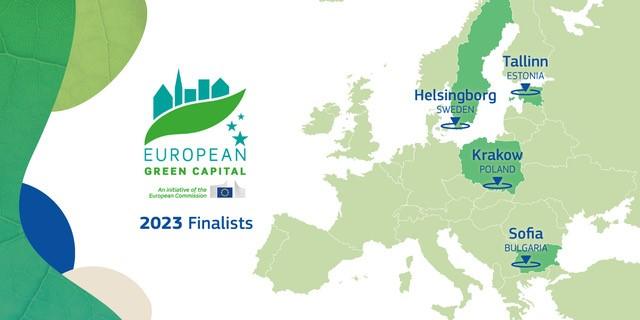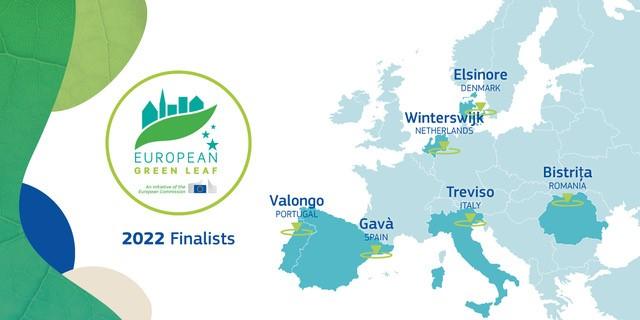Ten European cities are showing the way to resilience and sustainability as they enter the final stage of the European Green Capital and Green Leaf Awards in these times of unprecedented health, social and economic crises. The cities have been shortlisted based on their commitment in addressing urban environmental challenges and making their cities ‘fit for life’. The European Green City Awards aim to show that going green is possible, no matter your starting point.
Helsingborg (Sweden), Krakow (Poland), Sofia (Bulgaria) and Tallinn (Estonia), are the four finalists for the title of European Green Capital 2023.
Bistrița (Romania), Elsinore (Denmark), Gavà (Spain), Treviso (Italy), Valongo (Portugal) and Winterswijk (Netherlands) have been shortlisted for the title of European Green Leaf 2022. This contest is open to smaller cities and can nominate up to two joint award winners every year.
Commissioner for the Environment, Oceans and Fisheries, Virginijus Sinkevičius, said:
As we slowly start seeing the light at the end of the tunnel for the pandemic, the fight continues for our climate and the environment. A systemic change in our societies and economies is needed, to shape them more in balance with the needs of the planet. We all have a part to play, but in particular our cities, who provide a home to 75% of the European population. I am pleased to see that despite these challenging times, European cities are taking the lead in making their urban environment better and healthier places to live. If they can do it, others can do it too. This is one of the tools European cities can resort to in order to implement the climate and environment objectives of the European Green Deal.
In their role as ‘Ambassadors for Change’, title winners will motivate and inspire other cities in Europe and increasingly the world by promoting sharing knowledge and expertise and driving innovation as well as cooperation with citizens and businesses. They will show that green cities do better, not only environmentally but also economically and socially. They provide better quality of life for their citizens.
The finalist cities will now enter the final stage of the competition: convincing an international jury in September of their serious commitment to sustainable urban development, their capacity to act as a role model to other cities, and their strategy for communicating and engaging with their citizens. The winners for the title of European Green Capital 2023 and European Green Leaf 2022 will be revealed at the official Awards Ceremony taking place on 9 September in Lahti, the European Green Capital of this year.
The winner of the European Green Capital 2023 title will receive a financial prize of €600,000 and the winner(s) of the European Green Leaf 2022 title €200,000 (max. 2 winners). The financial prizes are intended to be used as a contribution towards implementing the initiatives and measures to enhance the cities’ environmental sustainability as part of the laureate year, as set out in the city's sustainability vision presented at the jury meeting.
Background
The European Green Capital Award was launched in 2008 with the objective of pushing cities to be greener, healthier as well as more sustainable places to live. The role of local authorities is of great importance in making Europe’s cities more sustainable. With 75% of the European Union’s population living in cities and with the urban population expected to rise even further, cities play the leading role in making Europe more sustainable, leading by example and inspiring and motivating others to jump on board.
The European Green Capital Award is presented to a city with more than 100 000 inhabitants that is at the forefront of environmentally friendly urban living. Each year, a panel of independent urban sustainability experts assesses the performance of the competing cities against 12 environmental indicators and selects finalists. In addition to providing inspiration to other cities, winning cities benefit from an increased profile, which serves to enhance their reputation and make them an attractive, sustainable destination for people to visit, work and live in.
To date, 13 cities have been awarded the title of European Green Capital: Stockholm, Sweden, won the inaugural title, followed by Hamburg, Germany (2011); Vitoria-Gasteiz, Spain (2012); Nantes, France (2013); Copenhagen, Denmark (2014); Bristol, UK (2015); Ljubljana, Slovenia (2016); Essen, Germany (2017); Nijmegen, The Netherlands (2018); Oslo, Norway (2019); Lisbon, Portugal (2020) and Lahti, Finland (2021). Grenoble won the title for 2022.
Following the success of the European Green Capital Award, the European Green Leaf Award (EGLA) was established in 2015 to recognise the environmental efforts and achievements of smaller towns and cities (20 000 – 100 000 inhabitants). The same panel of 12 independent urban sustainability experts (mentioned above) assesses the applications received based on 6 environmental topic areas and selects the finalists.
To date, 11 cities have been awarded the title of European Green Leaf: Mollet del Vallès, Spain (2015); Torres Vedras, Portugal (2015); Galway, Ireland (2017); Leuven, Belgium (2018); Växjö, Sweden (2018); Cornellà de Llobregat, Spain (2019); Horst aan de Maas, the Netherlands (2019); Limerick, Ireland (2020); Mechelen, Belgium (2020). Grabovo, Bulgaria and Lappeenranta, Finland share the title for 2021.
With each competition cycle, winners and finalists join forces and expand the European Green Capital and Green Leaf Networks. Chaired by the European Commission and in close collaboration with the laureates of the running year, these prestigious networks of European cities share knowledge and expertise and inspire other cities to follow in their footsteps.
Details
- Publication date
- 6 July 2021
- Author
- Directorate-General for Environment



